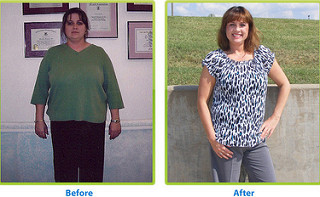Lose Weight > Common Sense To Lose Weight > Common Sense Article > Fast Weight Loss For Teens-the First Steps To Losing Weight
Fast Weight Loss For Teens-the First Steps To Losing Weight
The first step to losing weight is figuring out a strategy for your weight loss. Teenagers will not only want to learn how to lose extra weight but how to keep extra weight off for a life time. Keeping weight off as you grow older can be even more challenging as your metabolism slows down.
First of all forget about blame and guilt. You don\'t want to blame yourself or your parents for the fact that you are now overweight. Feeling guilt about your appearance or anger at your parents for letting or making you overweight is a waste of time and won\'t solve your weight problem. Negative feelings could actually make you want to over eat!
Look at your weight loss program as a long term commitment to a healthier lifestyle. You don\'t want to settle for quick weight loss without making changes that last because you will be likely to gain that weight back as quick as you lost it. You want to change your habits to making nutritious food choices, increasing the amount of exercise you do and making some cut backs on your food intake.
You will want to set some very reasonable goals such as losing one half to 2 pounds per week. This will depend on how over weight you are and your size. You should not eat less than 1300 calories per day because you need to get enough nutrients and you also need to feel somewhat satisfied with your food intake.
You will want to add some exercise to your daily routine. It is likely that you have been caught in a viscous cycle of no exercise, having no energy to exercise, eating too much and not exercising. Then feeling like you have even less energy and repeating this no win cycle. Exercising will make you feel more energetic and then you will be in a positive cycle. The more you exercise the more energy you will have and the more you will be able to exercise. However at first you will have to push yourself to start. You may want to start by just walking. After a few weeks of walking you will feel more energetic. You will probably be bored of walking and want to run, shoot hoops, bicycle, roller blade or some other more vigorous activity.
You will want to ask your family to help you. They can help by purchasing and preparing healthy meals and snacks. And parents can avoid purchasing those foods which will temp you to make poor choices. Let parents know what your food weaknesses are if they don\'t already know. Make a pact to keep those chips, cookies, donuts, candies and ice cream out of the house.
Measure your success in a variety of ways. Success is not how you look in the mirror or a number on the bathroom scale. Success is making healthier food choices, spending more time in physical activity, increasing your strength and endurance, improving your energy level and most important, feeling better about yourself.
Be sensible about goals for weight loss. Don\'t try to look like a model in a fashion magazine or super thin actors you see on TV or in movies. Many of the glamorous people are too thin and maybe unhealthy as well. Look instead to athletes with full muscular bodies. This is not to say you have to become a sports star but you can look and feel good after you develop good eating habits and an active lifestyle.
It is a good idea to schedule a visit with your primary care physician. He or she can probably give you some good advice on weight loss and help you set realistic healthy goals.
Have you ever starved yourself and didn\'t lose a pound? Or do you know someone this has happened to?
Anytime you lower you caloric intake, your body takes notice and immediately goes into it\'s starvation prevent mode. In other words, if you eat less, your body burns less.
This is great if you are starving, not so great when you are trying to lose weight.
Instead of lowering your calories, try shifting your calories instead. This is something new to the diet industry but by changing what you eat and when you eat it fools the body into burning more calories then it normally would.
Related Articles
-
The Easiest Way to Burn Fat Fast
Have you heard? Some people say that the easiest way to burn fat is
-
Need To Lose Weight? These Diet Tips Might Help You!
Reducing your daily caloric intake will
-
10 Weightloss Tips That Guarantee Success
There is so much conflicting information
-
Sustainable Weight Loss Requires Proper Planning
Your weight loss diet helps your program
-
Hunger, Energy Balance, Satiety And Weight Loss
The body is a mechanism that is constantly correcting its course to ma
-
Fitness and Weight Management Programs!
Get the tools you need to personalize a weight management program t
- DON'T MISS
- Skinny Fat – Being Thin Does Not Always Mean You’re Lean
- Can Green Coffee Aid Weight Loss?
- How To Reach Your Healthy Weight
- Healthy Diet plan Recipe – soup that burn physique fat for weight reduction
- Overhaul Your Eating Habits Substitute Flavor For Fat
- Weight Loss – It’s Mind Over Fatter
- Top Weight Loss Techniques - How Does Your Weight Affect You Emotionally?
- Advanced Hypnotherapy For Weight Loss Practiced In Orange County, Laguna Niguel, Irvine & Ca
- 7 Benefits Of Drinking Hot Water
- Lose Weight After Giving Birth - 5 Important Learnings About Weight Loss & Its Safety




